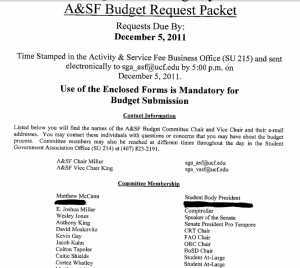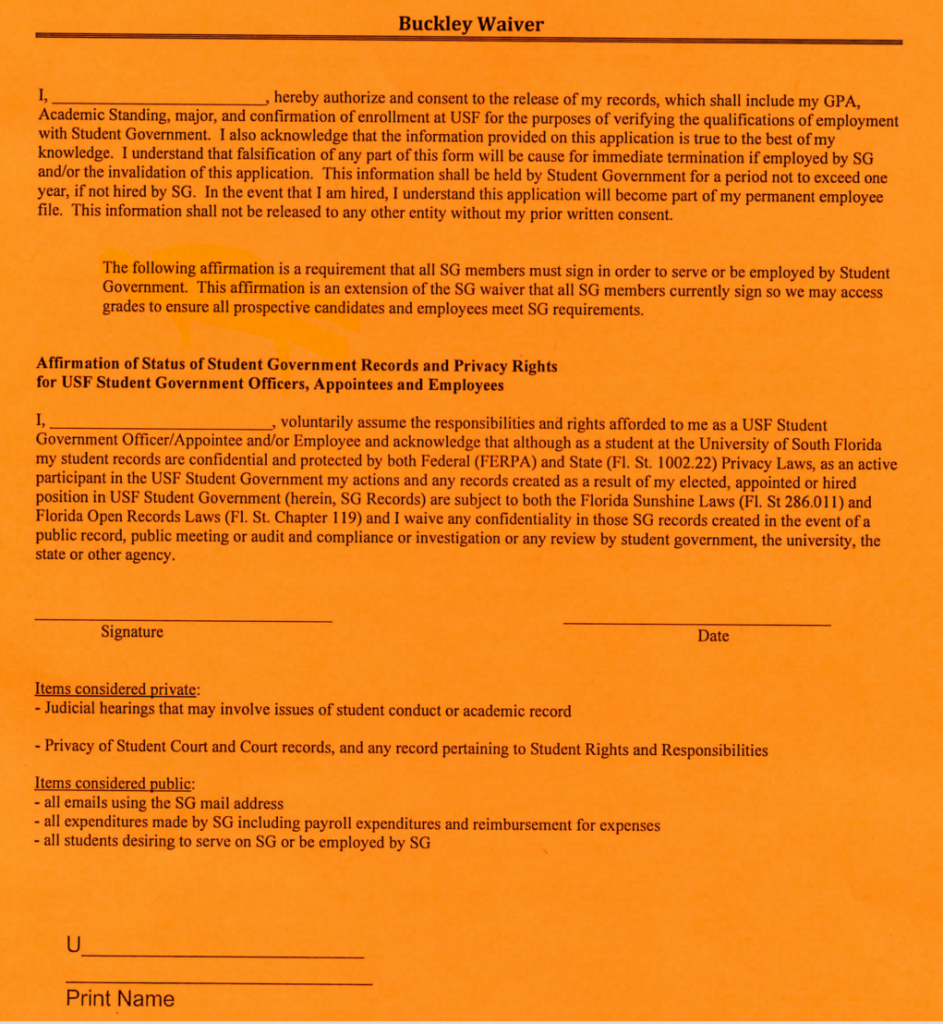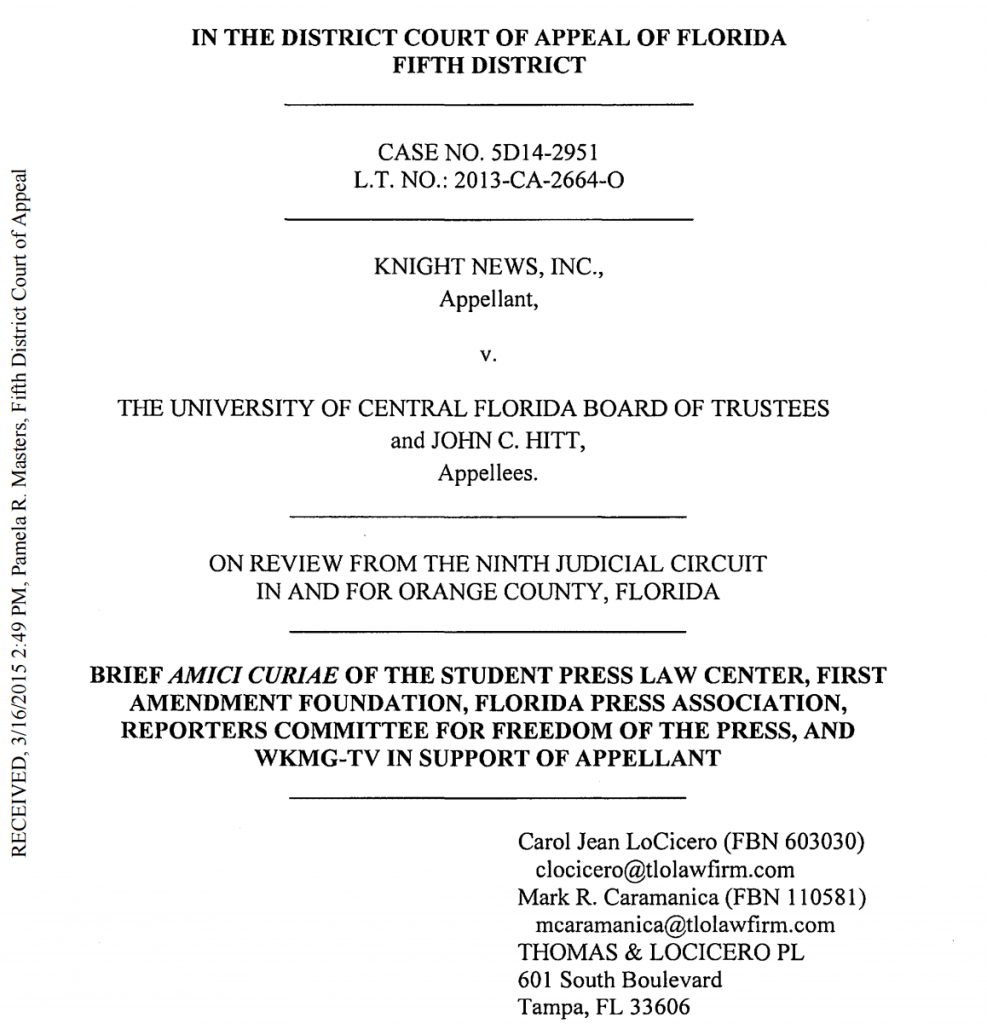UCF’s lawyers give student government officials at UCF the power to have their names blacked out on public record documents that often have to deal with the spending of students’ money — at least, for now.
UCF claims that these officials have the right to redact their names, if they so please, because UCF believes the information on these SGA documents is covered under a privacy law called FERPA.

FERPA stands for the Family Education Rights and Privacy Act. It is a federal privacy law that gives college students certain protections with regard to their educational records, such as report cards, transcripts, disciplinary records and class schedules. Many lawyers disagree with UCF’s position that an SGA budget document falls under the same category as a private educational record.
All of this year’s candidates have expressed that they are in favor of more transparency when it comes to SGA officials having their names redacted from public records. Candidates Zona and Stein have already promised to have their chosen cabinet members sign a waiver requiring their names be shown on all SGA documents if elected.
“As for SGA candidates and their name being released, we do believe that all SGA officials and candidates should give permission for their names to be shown on all SGA documents,” Zona and her running mate said in a statement. “Jarell and I have had many public records requested and we have always had our names be shown. As for next year, we would most definitely have our Cabinet sign the FERPA release if elected. We fully stand behind keeping student government accountable and being fully transparent with the students. We have exemplified this through our open leadership in the past.”
During the presidential debate, Stein slammed SGA for their lack of transparency with students.
“You have to request that information, you have to do it through all the loop holes,” Stein said. “So, I mean, I’m just taken aback that this is student money and yet it’s not shown to students. So first thing I would do is I would require all my cabinet members to sign a waiver saying that they would release their names for all public information requests, make sure I push for legislation as well, that all SGA candidates sign this waiver as well.”
Zagrocki has not said yet if he would require his cabinet members to sign the waiver, but seemed doubtful that FERPA should cover up names of people who choose to run for office.
“The moment that you walk into that SGA realm, you’re essentially a public servant for the students,” Zagrocki said. “At that point transparency takes the up most importance….As long as we fit within the legality, I want SGA to be as transparent as possible. There’s different things we can do to promote that as well. It’s reforming the SGA website, making sure people are aware of what we do in SGA, things like that. There is always room for better promotion and transparency.”
The University of South Florida requires all members of SGA sign a waiver so that there is no question as to whether their names will show up on public documents such as budget requests or impeachment votes.

Stein does not believe FERPA applies to SGA records and was disappointed that Knight News had to file a lawsuit against UCF to fight for the public’s right to see how and which SGA officials are spending students’ money.
“It’s sad that a lawsuit needs to be filed to force the SGA to abide by already established rules and legal requirements,” Stein said. “Regardless of the election results next week, I will remain committed to helping students at UCF and across the state hold their leaders accountable. Students deserve better.”
The lawsuit Knight News filed two years ago is still working its way through the courts. The lawsuit was essentially split up into three main issues. These included: Whether FERPA protects SGA records, whether UCF can have secret Greek conduct hearings, and whether UCF can delay public records requests by forcing a requester to obtain records from UCF’s public relations office rather than the office that actually has the record.
The trial judge ruled UCF staff broke Florida’s public record law on the third issue, but sided with UCF on the other two issues and other remaining counts. UCF did not appeal the issue it lost to Knight News, however, Knight News did appeal the issues it lost — and is now backed by numerous lawyers for media organizations and First Amendment groups in Florida and across the country.

The Student Press Law Center brought the groups together to file a friend of the court brief for Knight News that blasts UCF’s position that FERPA protects SGA records the same way it does a student’s private education record such as an SAT score.
“Indeed, if these were genuinely FERPA records, the University would have quite a lot to explain about letting dozens of students handle ‘confidential education records’ in a non secure manner,” according to the amicus brief.
The brief goes on to say, “In reality, colleges have regularly granted access to exactly the type of records sought by the journalists here, with no FERPA repercussions.”
UCF has not yet filed its response to the appeal.






